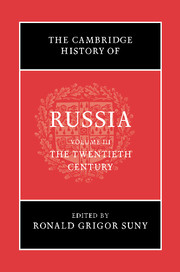Book contents
- Frontmatter
- Introduction
- 1 Reading Russia and the Soviet Union in the twentieth century: how the ‘West’ wrote its history of the USSR
- Part I Russia and the Soviet Union: The Story through Time
- Part II Russia and the Soviet Union: Themes and Trends
- 14 Economic and demographic change: Russia’s age of economic extremes
- 15 Transforming peasants in the twentieth century: dilemmas of Russian, Soviet and post-Soviet development
- 16 Workers and industrialization
- 17 Women and the state
- 18 Non-Russians in the Soviet Union and after
- 19 The western republics: Ukraine, Belarus, Moldova and the Baltics
- 20 Science, technology and modernity
- 21 Culture, 1900–1945
- 22 The politics of culture, 1945–2000
- 23 Comintern and Soviet foreign policy, 1919–1941
- 24 Moscow’s foreign policy, 1945–2000: identities, institutions and interests
- 25 The Soviet Union and the road to communism
- Bibliography
- Index
- References
21 - Culture, 1900–1945
from Part II - Russia and the Soviet Union: Themes and Trends
Published online by Cambridge University Press: 28 March 2008
- Frontmatter
- Introduction
- 1 Reading Russia and the Soviet Union in the twentieth century: how the ‘West’ wrote its history of the USSR
- Part I Russia and the Soviet Union: The Story through Time
- Part II Russia and the Soviet Union: Themes and Trends
- 14 Economic and demographic change: Russia’s age of economic extremes
- 15 Transforming peasants in the twentieth century: dilemmas of Russian, Soviet and post-Soviet development
- 16 Workers and industrialization
- 17 Women and the state
- 18 Non-Russians in the Soviet Union and after
- 19 The western republics: Ukraine, Belarus, Moldova and the Baltics
- 20 Science, technology and modernity
- 21 Culture, 1900–1945
- 22 The politics of culture, 1945–2000
- 23 Comintern and Soviet foreign policy, 1919–1941
- 24 Moscow’s foreign policy, 1945–2000: identities, institutions and interests
- 25 The Soviet Union and the road to communism
- Bibliography
- Index
- References
Summary
Russian culture in the first two decades of the twentieth century came under influences that could be found in most European cultures. New audiences transformed taste cultures. The decline of monarchies and ascent of industrial capitalism made art patrons of the bourgeoisie. Modern technology turned the lower classes into a mass audience. Aristocratic arts institutions faced competition from new organisations, many of them private and open to the general public. Cultural life reached social groups once excluded on the basis of class or nationality. The fast-paced, fragmented life of the modern city insinuated itself into all art forms, from the cinema to painting and poetry, and artists struggled to create satisfying art forms from the chaos of modern life.
Russian culture was also influenced by circumstances distinct from other cultures. The first was the intelligentsia, a self-defined class of educated people who sustained social and cultural life under the profoundly undemocratic conditions of tsarism. The second was the October Revolution, which separated Russia from European cultures after 1917, and fundamentally reconfigured the cultural life of the country. The Bolsheviks considered themselves heirs to the great tradition of the intelligentsia when they seized power on 25 October 1917. As an underground party before the revolution, they had organised the working masses by propaganda and education. After the revolution, they used the resources of the state to foster an entirely new consciousness in Soviet citizens, particularly those who came of age after they took power. Few would argue the reach of this cultural programme, though many would dispute the quality of the transformation and the benefits gained by the Soviet people.
- Type
- Chapter
- Information
- The Cambridge History of Russia , pp. 579 - 604Publisher: Cambridge University PressPrint publication year: 2006
References
- 1
- Cited by



